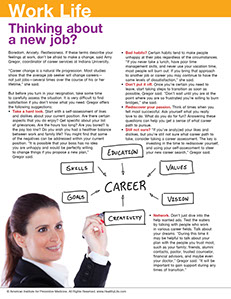SYMPTOM CHECKER
CONDITIONS
Male
Female
Child
Arm, Hand & Shoulder Concerns
Legs & Feet Concerns
Dental & Mouth Concerns
Ear & Nose
Eye Conditions
Head Conditions
Arm, Hand & Shoulder Concerns
Legs & Feet Concerns
Front
Back
Arm, Hand & Shoulder Concerns
Dental & Mouth Concerns
Ear & Nose
Eye Conditions
Head Conditions
Arm, Hand & Shoulder Concerns
Dental & Mouth Concerns
Ear & Nose
Eye Conditions
Head Conditions
Front
Back
Arm, Hand & Shoulder Concerns
Neck Links
Head & Neck Concerns
Arm, Hand & Shoulder Concerns
Neck Links
Head & Neck Concerns
Front
Back
Online Clinic
Wise Healthcare
Thinking about a new job?

Print on Demand
Boredom. Anxiety. Restlessness. If these terms describe your feelings at work, don’t be afraid to make a change, said Amy Gregor, coordinator of career services at Indiana University.
“Career change is a natural life progression. Most studies show that the average job seeker will change careers—not just jobs—several times over the course of his or her lifetime,” she said.
But before you turn in your resignation, take some time to carefully assess the situation. It is very difficult to find satisfaction if you don’t know what you need. Gregor offers the following suggestions:
• Take a hard look. Start with a self-assessment of likes and dislikes about your current position. Are there certain aspects that you do enjoy? Get specific about your list of grievances. Are the hours too long? Are you bored? Is the pay too low? Do you wish you had a healthier balance between work and family life? You might find that some of the negatives can be addressed within your current position. “It is possible that your boss has no idea you are unhappy and would be perfectly willing to change things if you propose a new plan,” Gregor said.
• Bad habits? Certain habits tend to make people unhappy at their jobs regardless of the circumstances. “If you never take a lunch, have poor time management skills, and never use your vacation time, most people will burn out. If you bring that approach to another job or career you may continue to have the same levels of dissatisfaction,” she said.
• Don’t put it off. Once you’re certain you need to leave, start taking steps to transition as soon as possible, Gregor said. “Don’t wait until you are at the point where you are so frustrated you’re willing to burn bridges,” she said.
• Rediscover your passion. Think of times when you felt most successful. Ask yourself what you really love to do. What do you do for fun? Answering these questions can help you get a sense of what career path to pursue.
• Still not sure? “If you’ve analyzed your likes and dislikes, but you’re still not sure what career path to take, consider taking a career assessment. The key is investing in the time to rediscover yourself, and using your self-assessment to steer your new career search,” Gregor said.
• Network. Don’t just dive into the help wanted ads. Test the waters by talking with people who work in various career fields. Talk about your dreams. “During this time it may be helpful to talk about your plan with the people you trust most, such as your family, friends, alumni contacts, pastor, trusted counselor, financial advisors, and maybe even your doctor,” Gregor said. “It will be important to gain support during any times of transition.”
This website is not meant to substitute for expert medical advice or treatment. Follow your doctor’s or health care provider’s advice if it differs from what is given in this guide.
The American Institute for Preventive Medicine (AIPM) is not responsible for the availability or content of external sites, nor does AIPM endorse them. Also, it is the responsibility of the user to examine the copyright and licensing restrictions of external pages and to secure all necessary permission.
The content on this website is proprietary. You may not modify, copy, reproduce, republish, upload, post, transmit, or distribute, in any manner, the material on the website without the written permission of AIPM.
2021 © American Institute for Preventive Medicine - All Rights Reserved. Disclaimer | www.HealthyLife.com















































